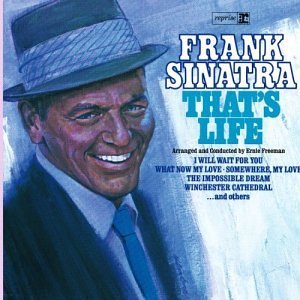
That's Life is a 1966 album by Frank Sinatra, supported by a studio orchestra arranged and conducted by Ernie Freeman. The album is notable for its title song, "That's Life", which proved to be a top five hit for Sinatra at a time when rock music dominated the music charts. That's Life was released on CD in October 1986.

Sinatra–Basie: An Historic Musical First is a 1962 studio album by Frank Sinatra, arranged by Neal Hefti.
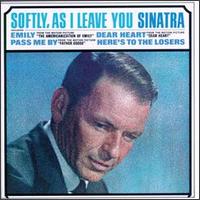
Softly, as I Leave You is a 1964 studio album by American singer Frank Sinatra. Arranged by Ernie Freeman, several tracks such as "Softly, as I Leave You", "Then Suddenly Love" and "Available" departed from Sinatra's signature vocal jazz style by flirting with a more contemporary pop sound. The rest of the album is pieced together with leftovers from various early-'60s sessions, from many different arrangers and conductors.
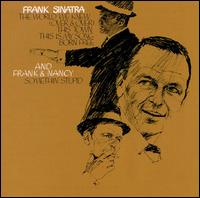
The World We Knew, also known as Frank Sinatra, is a 1967 studio album by American singer Frank Sinatra.

Thighs and Whispers is the fifth studio album by American singer Bette Midler. Released in 1979, the album reached No. 65 on the Billboard Pop Albums chart.

Lite Me Up is a pop album with a strong disco-funk feel by Herbie Hancock. It was Hancock's twenty-eighth album and first release without producer David Rubinson since 1969. On this album, Hancock was influenced by his long-time friend, producer Quincy Jones and sessions included many musicians associated with Jones including Steve Lukather and Jeff Porcaro of Toto. The album was the first on which Hancock played the Synclavier, a digital polyphonic synthesizer.

The Paul Simon Anthology is the fourth greatest hits compilation album by American singer-songwriter Paul Simon, which was released in 1993. It featured one previously unreleased track, "Thelma".

The Warriors: The Original Motion Picture Soundtrack is the soundtrack to the 1979 film The Warriors. The soundtrack was released on March 16, 1979, by A&M Records.

Pastiche is an album by the Manhattan Transfer, released in 1978 by Atlantic Records. This was the last studio album the Manhattan Transfer recorded with Laurel Massé, who because of a car accident in early 1979 decided to end her association with the group. The album was re-issued on CD with Rhino as distributor in 1994.

Our Shining Hour is a 1965 studio album by Sammy Davis Jr., accompanied by the Count Basie Orchestra, arranged by Quincy Jones.
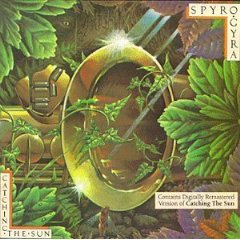
Catching the Sun is the third album by the American jazz group Spyro Gyra, released in 1980 on MCA Records. The album was given gold status by the RIAA on June 5, 1985.

Bi-Coastal is the sixth studio album released in 1980 by Australian singer and songwriter Peter Allen.

Chaka is the debut solo album by singer Chaka Khan, released on October 12, 1978 through Warner Bros. Records label.

Frank Sinatra's Greatest Hits! is the first compilation by American singer Frank Sinatra released on his own Reprise Records. It concentrates on mostly single releases from the mid to late 1960s, which fluctuates between adult contemporary pop and jazzy swing. The album opens up with Sinatra's recent number one hit "Strangers in the Night" and continues through the varied styles of music Sinatra recorded in the 60s, from easy listening ballads like "It Was a Very Good Year" and "Softly, as I Leave You" to contemporary pop like "When Somebody Loves You" and "That's Life". Greatest Hits was a modest hit, peaking at #55 on the album charts in late 1968. A second volume was issued in 1972, Frank Sinatra's Greatest Hits, Vol. 2. Both albums have since been supplanted with newer and more cohesive compilations.

Sounds...and Stuff Like That!! is a 1978 studio album by Quincy Jones.
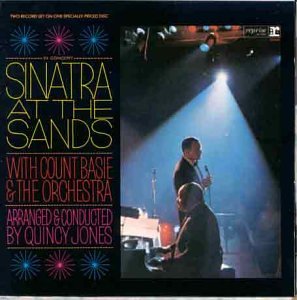
Sinatra at the Sands is a live album by Frank Sinatra accompanied by Count Basie and his orchestra, and conducted and arranged by Quincy Jones, recorded live in the Copa Room of the former Sands Hotel and Casino in Las Vegas in 1966.
"It's the Falling in Love" is a song by American recording artist Michael Jackson with guest vocals by R&B singer–songwriter Patti Austin. It is the ninth track from his fifth studio album, Off the Wall (1979). It was written by Carole Bayer Sager and David Foster, with production by Quincy Jones.

H is the eighth album by jazz keyboardist Bob James.

Killer Joe is an album by Benny Golson recorded in 1977 and released by the Columbia label. This was Golson's first jazz album in over a decade when his career has been devoted to writing music for television and motion pictures.
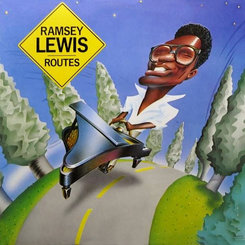
Routes is a studio album by American jazz pianist Ramsey Lewis, released in 1980 on Columbia Records. The album reached No. 7 on the Billboard Top Jazz Albums chart.



















